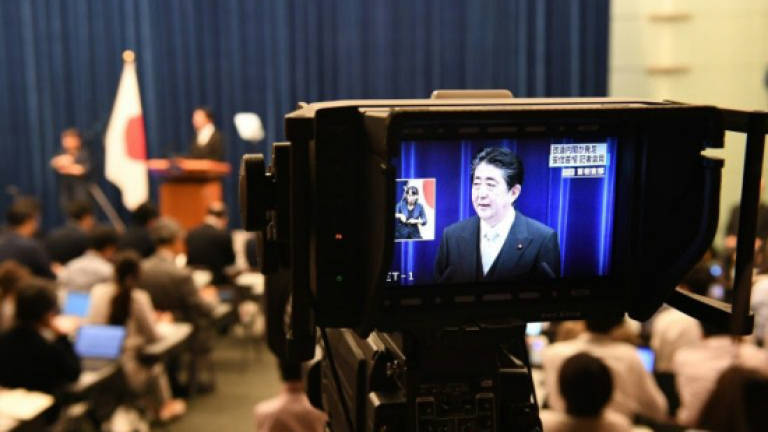Japan's cronyism scandal: could it hurt Abe?

TOKYO: Japan's finance minister admitted Monday that his department made 14 changes to documents related to a controversial land sale that has sparked allegations of favouritism against Prime Minister Shinzo Abe.
The complex scandal appears to have dented Abe's popularity as he attempts to win re-election as head of his ruling party in Sept.
What is the scandal about?
The scandal revolves over the 2016 purchase of a plot of land in Osaka by the right-wing operator of an ultra-conservative kindergarten.
The school, Moritomo Gakuen, reportedly paid just 134 million yen (RM4 million) for the 9,000 square metre plot — around one tenth of the price for a comparable spot nearby.
Why is it damaging for Abe?
The school's operator, Yasunori Kagoike, claims ties to Abe and his wife Akie and the opposition have alleged that the cut-price deal was sealed due to Kagoike's high-level connections.
Kagoike claimed he received a one-million-yen donation from Abe via his wife for the school — which the prime minister strenuously denies.
Akie was named honorary principal of the school but stepped down when the land scandal swirled.
Why has it resurfaced?
The scandal appeared to have died down and Abe won a fresh term in office last year with a resounding majority despite opposition parties trying to raise the issue during campaigning.
But earlier this month, the Asahi Shimbun reported that documents relating to the land sale had been altered before being presented to lawmakers.
Finance Minister Taro Aso was forced to admit that key passages were deleted from the documents eventually presented to parliament, sparking allegations of a cover-up.
Among the names removed were those of Abe, his wife Akie and Aso himself, according to documents published by opposition lawmakers.
What have been the consequences?
The scandal has already hurt Abe politically and was largely blamed for his Liberal Democratic Party (LDP) being humiliated in Tokyo mayoral elections in 2016.
It was also a factor in the resignation of former defence minister Tomomi Inada, who was forced to step down after it emerged she had represented Kagoike in court having previously denied it.
Nobuhisa Sagawa, the head of the National Tax Agency, quit last week over the scandal, with some reports suggesting he ordered the documents altered.
A finance ministry official involved in the scandal was found dead last week in an apparent suicide although it is not clear whether there is a direct link.
Abe has been largely free from the scandals that have afflicted previous Japanese prime ministers but his popularity already seems to have taken a hit.
For the first time since he won re-election in Oct, his approval rating dipped below 50%, according to the most recent poll.
How damaging is this for Abe?
Despite an apparent blip over the scandal, Abe enjoys approval ratings that would be the envy of British Prime Minister Theresa May or US President Donald Trump.
Opposition to his LDP-led government remains fragmented and weak and Abe has a two-thirds majority in parliament that gives him a very powerful base.
"If it's found that the documents were actually rewritten, it would deal a heavy blow to the Abe administration," said Shinichi Nishikawa, professor of politics at Meiji University in Tokyo.
"His support rate is likely to fall, but Abe is still likely to survive the scandal by saying 'This was done by finance ministry bureaucrats'," Nishikawa told AFP.
Abe is seeking re-election as head of the LDP in Sept which would set him on course to become the country's longest-serving leader.
For the moment, no challenger has put his head above the parapet but the scandal could damage Abe, at a time when the hawkish prime minister wants to make controversial changes to the constitution and has to deal with the North Korean crisis.
"Abe's situation could become more precarious if his approval ratings begin to fall again. In this case, it would create space for a rival to argue that a scandal-weary public is ready for change," said Tobias Harris, vice-president of the Teneo Intelligence think-tank.
Pressure is also mounting on Aso at a time when the world's third-largest economy is enjoying its longest run of growth since the bubble days of the 1980s.
Aso said he had no intention to resign over the scandal. — AFP